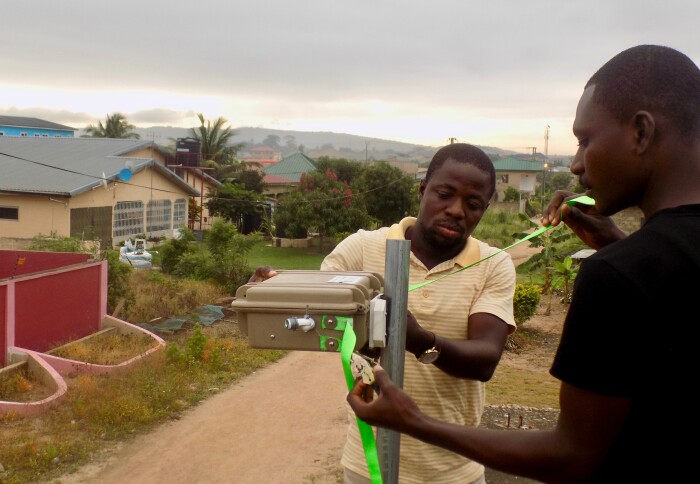Major research project to boost climate change resilience of Africa’s cities

A major new research project led by Imperial and partners in Africa aims to strengthen the climate change resilience of cities across the continent.
The £6million project is funded by Wellcome and will help to significantly enhance resilience to the health impacts of climate change in Africa’s cities.
As extreme weather events increase in magnitude and frequency because of climate change, urban cities will face challenges in managing the effects of floods, droughts and heatwaves.

The team of researchers aim to better understand the effects of climate change in African cities and the impact that extreme changes in temperatures, rainfall, humidity and wind will have on population health, city infrastructure, work and industry, sanitation and schools.
The project will engage closely with local stakeholders to incorporate critical insights to help shape strategies and commitments to mitigate climate-change-induced health risks in cities across Africa.
The team of researchers will collect a range of data to analyse including temperature, water depth and quality, and sanitation. The work will also focus on the health impacts on vulnerable groups and communities.
The researchers will also use surveys, sensors, imaging and satellite data to identify and assess technologies or strategies that can be adapted to mitigate the effects of climate change.
For example, the researchers hope that their work will help inform the design of future school buildings and their outside areas so that they are resilient to the effects of hotter temperatures.
African cities also tend to have a higher proportion of outdoor workers who would be impacted by rising daytime temperatures.

The project will focus on four cities in Africa: Accra and Tamale in Ghana and Kigali and Musanze in Rwanda. These four cities have a range of urban characteristics including large and small, coastal and inland, tropical and Sahelian.
The research builds on previous work to explore ways of reducing health inequalities in cities around the world. This work saw Accra become the African city with the highest density of air pollution sensors and the research team now hope to conduct similar work to monitor climate change impacts with temperature and water sensors.
The new project, Climate Change Resilient Equitable Healthy Cities in Africa (CLARITY-Africa), is led by Professor Majid Ezzati, the Academic Director of Imperial Global Ghana – the university’s first African hub.
Professor Ezzati, from Imperial’s School of Public Health, said: “Climate change will affect society in all kinds of ways – from people’s physical and mental health, to infrastructure, and the future of learning and work. Cities in Africa will be among some of those most impacted by the challenges and consequences of climate change. This project will help create a blueprint of action to create more resilient cities and society. Our work in Ghana and Rwanda will not only benefit cities in those countries but have applications for the wider continent and world.”
Madeleine Thomson, Head of Climate Impacts and Adaptation, Wellcome, said: "Climate change is endangering people’s health around the world, but those in already-hot regions are facing some of the biggest threats. And within this, some people are at extra risk – outdoor workers, those on lower incomes, young children, the elderly, and pregnant women. To protect lives we need to find ways to adapt and respond to increasingly frequent heatwaves, floods, and droughts. This research will help us find ways to do that throughout Africa with the potential for lessons that could be rolled out around the world."

The project will be co-led by academic partners including the African Institute for Mathematical Sciences (AIMS), University of Ghana and University Cape Town, the African Mayoral Leadership Initiative (AMALI) and through the African Urban Research Initiative (AURI) hubs.
Imperial Global Ghana
In November Imperial opened its newest Global hub in Ghana with a commitment to boost scientific collaboration as it launches new fellowships in AI and Climate Science.
Imperial is the first UK university to have a permanent base solely focused on science and technology in Africa.
Imperial Global Ghana will engage with and support academics and entrepreneurs in West Africa by strengthening collaboration on research, technology, education and entrepreneurship between West Africa and the UK.
The hub builds on Imperial’s established partnerships in the region, including in medical diagnostics, vaccine research, AI and data science, climate science, sustainable cities and entrepreneurship training.
Article supporters
Article text (excluding photos or graphics) © Imperial College London.
Photos and graphics subject to third party copyright used with permission or © Imperial College London.
Reporter
Stephen Johns
Communications Division